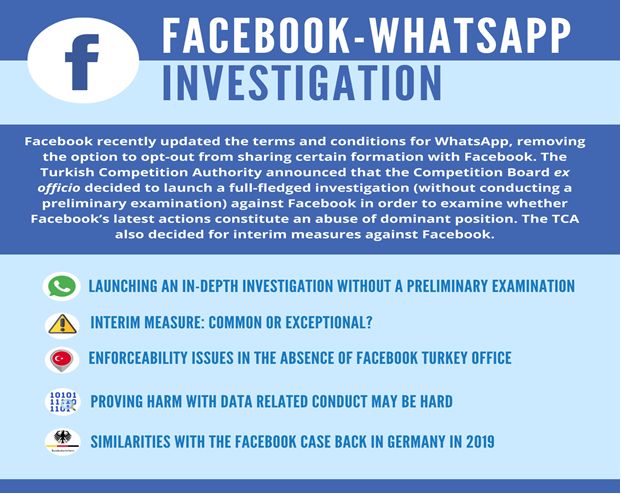Last week, WhatsApp users started to receive an in-app notification with respect to the service's new terms and its much-debated privacy policy. The notification mainly concerns key updates on how WhatsApp, as a Facebook subsidiary, processes user data, how businesses can use Facebook hosted services to store and manage their WhatsApp chats and how WhatsApp partners with Facebook to offer integrations across its products.
For most users, WhatsApp was stating the obvious and almost reiterating its previous update on July 2020, until they see the small letter statement below the screen:
"By tapping AGREE, you accept the new terms and privacy policy, which take effect on February 8, 2021. After this date, you'll need to accept these updates to continue using WhatsApp...".
While the previous update was providing the users with the option to opt out from sharing their WhatsApp account information with Facebook, the new update obliges the users to accept the new privacy policy, giving path to sharing the WhatsApp account information with Facebook if they intend to use WhatsApp services. Beyond all key updates, making the intra-group data sharing necessary for using the WhatsApp services inevitably triggered dozens of new legal debates.
In less than one week, while lawyers and data protection experts were trying to identify the legal issues and potential consequences along with the similar privacy policies of other mobile chatting platforms, the Turkish Competition Authority (the "TCA") blazed the trail and announced on its official website that the Competition Board ex officio decided to launch a full-fledged investigation (without conducting a preliminary examination) against Facebook Inc., Facebook Ireland Ltd., WhatsApp Inc. and WhatsApp LLC (collectively referred as "Facebook") in order to examine whether Facebook's latest actions constitute an abuse of dominant position.
The TCA's investigation announcement explicitly refers to WhatsApp's latest update on its privacy policy and provides an interpretation that the update at hand gives path to more data to be collected, processed and used by Facebook. Accordingly, the TCA also decided to implement an interim measure by obliging Facebook to withdraw WhatsApp's policy updates which were meant to enter into force by February 8th, 2021 and notify its withdrawal from the latest update to its users who have already accepted the updated terms or received the notification.
The TCA's decision could be deemed as interesting given that it carries the potential to spark several debates under the Turkish competition law enforcement and administrative law principles.
Launching an in-depth investigation without a preliminary examination
Under Article 40 of the Act No. 4054 on Protection of Competition (the "Turkish Competition Act"), the TCA has the authority to launch an investigation either further to a preliminary examination on whether an in-depth investigation required or without any preliminary examination. Having said that, in practice, the TCA frequently initiates a preliminary examination before launching a full-fledged investigation in order to collect information pertaining to the factual background of the allegations and competitive landscape of the relevant market from related parties and market players. In this respect, despite the clear provision of the Turkish Competition Act authorizing the TCA to initiate an in-depth investigation without a preliminary examination, this authority has been rarely exercised under Turkish competition law enforcement. Furthermore, once the investigation is launched without a preliminary examination, it could also be interpreted that the TCA is already in a position to provide sufficient information leading to legitimate competition law concerns which need to be assessed in an in-depth investigation.

Interim measure: common or exceptional?
Article 9(4) of the Turkish Competition Act provides that the TCA could take interim measures only if;
- There is an objective possibility that the investigated conducts could cause significant and irreparable damage,
- The measure could protect the situation prior to the investigated conduct,
- The measure does not go beyond the scope of the Board's final decision.
Accordingly, given that the TCA's authority to take interim measures is strictly conditioned upon the determination of significant and irreparable damage in the absence of the measure, there is no doubt that the TCA should exceptionally use such authority. Once the authority is exercised, the TCA must provide adequate reasoning for its decision and persuasive indicators demonstrating the possible damages in the absence of interim measure.
Notwithstanding, it is an undeniable fact that there is an upward trend under Turkish competition law enforcement for implementing interim measures which are frequently being subject to judicial review before administrative courts.
In any case, the TCA's interim measure decision against Facebook signals that the TCA opines Facebook's unilateral conducts through its data related activities within the scope of WhatsApp's latest updates on its terms and privacy policy could potentially cause significant and irreparable damage once they enter into force.
Enforceability issues in the absence of Facebook Turkey office/subsidiary
Another question which might arise from the TCA's decision could relate to the enforceability issue given that Facebook has not yet incorporated any representative office or affiliated entity in Turkey. One cannot ignore the fact that such questioning is based on legitimate and sound concerns.
Having said that, under Turkish competition law regime, the TCA's authority is based on effect doctrine, which specifies that all agreements, conducts and decisions restricting competition in any of the markets in Turkey could be subject to the Turkish Competition Act, rather than the principle of territoriality. Therefore, even in the absence of physical presence in Turkey, any undertaking causing anti-competitive effects in Turkish markets could be investigated by the TCA under the Turkish Competition Act.
The TCA's decision to launch investigation against Facebook is not the first investigation against a company lacking a physical presence in Turkey. Even in the absence of any representative or legal counsel, the TCA could apply to the procedure for international notifications through the Department of Foreign Affairs and relevant Turkish embassies or consulates (e.g. the TCA's Deutsche Bahn decision dated 16.12.2015 and numbered 15-44/740-267). The TCA could also decide to impose monetary fine against a foreign entity regardless of its presence in Turkey. In that case, the provisions under the Law No. 6183 on the Procedure for the Collection of Public Receivables along with general enforcement and attachment procedures would apply.
Proving Harm with Data Related Conduct
The TCA will be investigating Facebook around abuse of dominance allegations. No further information has been made public by the TCA's announcement, and one must see the details of the potential allegations for commenting in detail in this issue. However, there are certain aspects to consider even with limited information, when it comes to alleging abuse of dominance for data related conduct and zero-priced services.
In general, abuse of dominance allegations can be categorized under two main types: (1) exclusionary abuses, and (2) exploitative abuses. As their names indicate, exclusionary abuses considered to be resulting with exclusion of the competitors from the market, while the exploitative conduct results with extracting excessive amount of funds from customers.
For many years, competition law practice revolved around the exclusionary abuses, and for a good reason. Almost in any case, excluding competitors from entering market results with limited choices and high prices for customers. Competition watchdogs can prove the result of the exclusionary conduct as harm to the customers, with their refined economic models.
On the other hand, as for exploitative abuses, the competition authorities can use comparative tools or economic value tests to determine whether dominant undertaking adopts and exploitative strategy, and prove the harm to customers.
Exploitative abuses allegations with regards to data related practices is different from others. Although many say that data is the new oil, its presence and function is hardly resembles any commodity. Extracting data from customers does not result with the customers "losing their data"; rather it results with duplication of the relevant data. Therefore, proving harm to customers with data related practices is considered to be rather difficult, since the customers are not losing anything that can be easily measured with economic models.
Whether losing control over the data should be considered as a form of economic harm is subject to heated debates in competition law community. Many argue that loss of control over personal data is a topic of interest of data protection authorities, and should not cause competition law concerns for competition watchdogs.
Turkish Data Protection Authority (the "TDPA") also announced that it initiated an investigation against Facebook and WhatsApp. The TDPA is looking into WhatsApp's compliance with basic principles of obtaining consent for data transfers under the Protection of Personal Data (the "Turkish Data Protection Act"). In the face of the TDPA's announcement and discussions over the theory of harm, the TCA's authority for initiating this investigation is open to further discussions.
What was the issue back in Germany in 2019?
In February 2019, Germany competition authority Bundeskartellamt has decided that Facebook abused its dominant position by gathering excessive amount of data from its customers. Although the decision concerned geographic market of Germany, the decision of the Bundeskartellamt saw major discussions. Many argued that Bundeskartellamt failed to identify the theory of harm and stepped in the field of data protection law, while some said the decision was necessary to evolve the competition law practice to meet the new standards of digital economy.
Although the Regional Court of Dusseldorf decided to stay the execution of the Bundeskartellamt upon Facebook's challenge, the German Federal Court of Justice later annulled the stay of execution. The Regional Court of Dusseldorf is still in the review of the Bundeskartellamt decision, with no final judgment in place.
The fate of the Bundeskartellamt decision may also play a key role for the TCA's approach to Facebook in relation to terms and conditions of WhatsApp. We will see whether the TCA will set on the path similar to Bundeskartellamt, or leave the issue to the TDPA by acknowledging the challenges of proving economic harm to customers.
The content of this article is intended to provide a general guide to the subject matter. Specialist advice should be sought about your specific circumstances.


